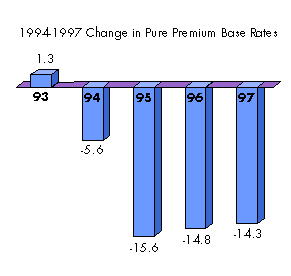| President's
Message
Actuarial |
Actuarial
Craig A. Anderson, Vice President
Ratemaking Developments
The Association’s fifteenth annual actuarial publication, the “ 1998 Minnesota Ratemaking Report,” was mailed to the membership in September. The overall average change in pure premium base rates was a decrease of 14.3%. Various relationships among the more recent pure premium and manual rate levels are as follows:
1. Relationship of 1-1-98 pure premium level to 1-1-97 premium
level -14.3%
2. Relationship of 1-1-98 pure premium level to 2-1-83
(pre-open competition) pure premium level -4.1%
3. Relationship of assigned risk rate level (4-1-98) to 2-1-83
manual rate level +79.8%As was customary in the 1984-1997 reports, the new pure premium base rates were derived excluding the following effects:
1. Eighth to ultimate report loss development,
2. Loss ratio trend indications to the midpoint of the experience
period,
3. All taxes and assessments such as the Special Compensation
Fund assessment,
4. Loss adjustment expenses, and
5. Other company operating expenses.Carriers were reminded to consider these items when preparing their own individual rate schedules. Calculations demonstrating various alternative approaches to determine the effects of a number of these additional phenomena were provided for carrier information. In addition, an IBM-PC compatible data disk was included with each Report, complete with all class base rates and rating values to assist carriers in ratemaking mechanics.
The Association continues to be statutorily required to present a summary of its Ratemaking Report to the Minnesota Workers’ Compensation Advisory Council (WCAC). As a portion of its duties the WCAC has the responsibility to review the Ratemaking Report for completeness, and adherence to statutory standards of adequate, non-excessive and not unfairly discriminatory rates.
This past October, the Minnesota Department of Labor and Industry again contracted with the Milliman & Robertson consulting actuarial firm to assist the WCAC in its evaluation of the Report. Milliman & Robertson again concluded that the Report was indeed statutorily complete, and commended the Association on its efforts to improve the Report’s discussion of assumptions and calculations.
